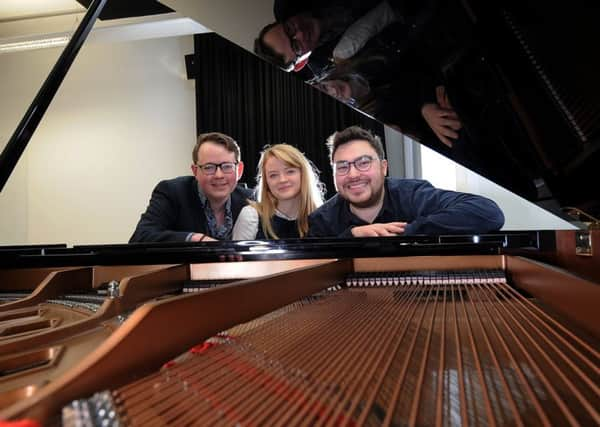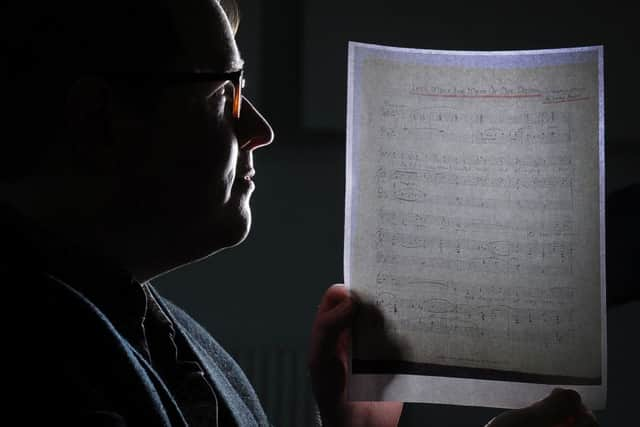Sheffield musical researchers bring lost Broadway songs back to life for unique concert


They were the shows that helped define what became known as Broadway’s ‘Golden Age’; post-war musicals such as Guys and Dolls, The King and I and Annie Get Your Get Your Gun that were driven by character and plot and resonate with audiences to this day.
But even in those boundary-pushing times when the likes of Rodgers and Hammerstein were determined to challenge audiences, some songs were deemed too controversial for public consumption and would never make it on stage or into Hollywood adaptations. Others meanwhile failed to make the cut for more prosaic reasons such as technical issues with staging them.
Advertisement
Hide AdAdvertisement
Hide AdHowever, almost 70 years on some of these lost compositions are to be performed in public for the very first time in Yorkshire this month thanks to an extraordinary project by researchers from the University of Sheffield’s Department of Music which has been led by Dr Dominic McHugh, Reader in Musicology, and his PhD student Joshua Goodman.


Now rehearsals are under way for a special concert in Sheffield on February 24 which will involve 23 either rarely or never heard-before songs performed by a 37-piece orchestra formed of university students and staff. Three of the songs have never been heard before anywhere in the world.
McHugh explains that the concert has been around 12 months in the planning but draws on years of his research across the globe.
“As part of my overall research, I go to archives all over the world looking at manuscripts of musicals from the ‘Golden Age’ written by the likes of Rodgers and Hammerstein and Cole Porter,” he says.
Advertisement
Hide AdAdvertisement
Hide Ad“It was the period from World War II up until 1965 where musicals became quite aspirational and tried to become the mainstream culture of America. This period was America’s equivalent of classical music in Europe.
“Over many years of doing research in archives at the Library of Congress, the New York Public Library and elsewhere, I have come across many songs written by major writers for popular musicals that for one reason or another have been discarded before being heard by the general public.
“They’re often cut for reasons other than their quality. Sometimes, the original performer didn’t like the song or struggled to perform it for technical reasons. Perhaps they didn’t work for the character or the musical had to be shortened.
“It’s incredibly exciting to be able to perform these little-known songs by Broadway’s best, in some cases for the very first time. We’ve been given special permission from the estates of Rodgers and Hammerstein, Cole Porter, Irving Berlin and others to bring these fascinating songs to Sheffield.”
Advertisement
Hide AdAdvertisement
Hide AdMcHugh has written books about his discoveries but says he is passionate about bringing the work to life. “While it is good to write books, if you don’t hear what they sound like, in a way I’m wasting my time. I really firmly believe in taking the university out into the community. The University of Sheffield was set up by penny donations from the ordinary people of Sheffield so that is part of the university’s ethos as well.”
Songs which did not make it on stage were often unfinished and so special orchestrations have been created for the concert by Goodman, Professor George Nicholson, the music department’s Head of Composition and leading Broadway orchestrator Larry Blank, whose work has been heard in shows such as The Producers and the movie Chicago.
“It takes months and months of work to make these two to three-minute songs into something that can be played,” McHugh explains. “You are taking little melodies and turning them into something for an audience.”
One of the songs being given its public debut is Now You Leave from The King and I, a musical which famously tells the story of a British schoolteacher hired as part of the King of Siam’s attempts to modernise his country.
Advertisement
Hide AdAdvertisement
Hide Ad“The King and I is a bit unusual because it is quite tame by modern standards but at the time Rogers and Hammerstein were really trying to make a statement to the West about the West that you can’t go around and tell everyone to be western and not consider the consequences,” McHugh says. But it appears the removal of Now You Leave shows there were restrictions with exactly how far to go with such a message.
“In the case of Now You Leave, Lady Thiang is rebuking Anna, played by Deborah Kerr in the film, for not facing the consequences of imposing Western values onto Siam. She has been there for some months as a teacher of English but has also disrupted the ethical, cultural and moral norms of the Royal Court.
“After a row with the King about his treatment of women she plans to take off, but the King’s wife, Lady Thiang, tries to stop her by firmly pointing out that if she really wants to make a difference, she should stay behind and participate.
“Perhaps it was just too strong an anti-colonialist message for a commercial musical in 1951 and the song seems to have been replaced by the romantic ballad Something Wonderful in which Lady Thiang asks Anna to stay out of affection for the King. Yet it’s a beautiful song and Larry Blank’s remarkable orchestration will help audiences to imagine how it might have sounded, had it been used in the original score.
Advertisement
Hide AdAdvertisement
Hide Ad“This and many of the other songs we’re bringing to light remind us that there are often serious and unsettling messages about society behind the glossy surface of the musical.”
One of the little-heard songs that will feature in the concert is Don’t Pass Me By which comes from the 1947 anti-racist musical Finian’s Rainbow.
The plot is a fantasy about an Irishman and his daughter who steal a leprechaun’s magic pot of gold and move to the United States, where they become involved in a dispute between rural landowners and a racist politician.
McHugh says the song, about what it feels like to be a victim of racism, chimed with the wider story of the production which examined racist attitudes in America and is thought to be the first Broadway musical with a racially integrated chorus line.
Advertisement
Hide AdAdvertisement
Hide Ad“It was an anti-racist musical about what it feels like to live in this racist society,” McHugh says.
“For 1947, this was an amazing message. One of the characters was a senator with a very similar name to a politician who had been around a year before.
“No one wanted to invest in the show because they thought it was too hot to handle. But the writers, including Yip Harburg, who wrote the songs for The Wizard of Oz, were determined to do it.”
‘Special experience for audience’
The Sheffield audience will be fortunate to hear the songs played by a large orchestra in the way Broadway theatre-goers would have once experienced, says Dominic McHugh.
Advertisement
Hide AdAdvertisement
Hide Ad“When you see a show now, you are lucky to have ten people in the orchestra. So to have it played by 37 is fantastic,” he says.
McHugh will present the concert, telling stories and anecdotes about why the songs were written and why they might have been cut, while the orchestra will be conducted by PhD student Joshua Goodman.
It will include songs related to beloved musicals such as Seven Brides for Seven Brothers, and Annie Get Your Gun, plus the rarely-heard overture from Cole Porter’s flop musical Seven Lively Arts.
Broadway’s Lost Chords and Hollywood’s Lost Tracks will be performed on Sunday February 24 at Firth Hall, Sheffield at 7:30pm. To book tickets, visit https://concerts.sheffield.ac.uk.